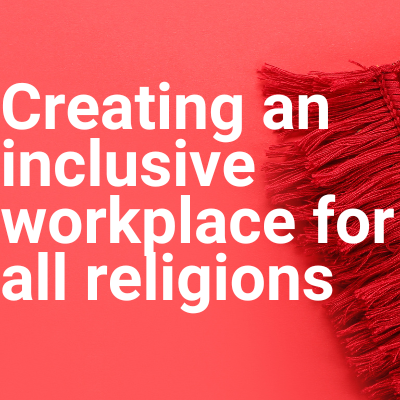As World Religion Day takes place on January 15, we wanted to explore the importance of respecting and accommodating different faiths in the workplace.
Not only is it against the law for an employer to discriminate against anyone because of their religion or belief (under The Equality Act 2010), but fostering an inclusive workplace creates a more fulfilling work experience and improves job satisfaction, productivity, morale and engagement.
Examples of potentially beneficial modifications to workplace practices, policies or procedures include:
-
Granting employee leave for religious observances
-
Offering flexible working
-
Providing a time and place to pray
-
Making exceptions to dress codes
-
Honouring dietary requirements
Here is some further guidance around how employers can support religious diversity in the workplace…
Acknowledge religious practices
Major religious and cultural holidays should be communicated via a shared work calendar to help set up work schedules and deadlines. Take steps to be mindful of these dates when planning meetings or events and raise team awareness of upcoming faith-related days so that everyone is aware of when a team member might be absent.
Allow employees time off for religious reasons
It’s important to be flexible with religions that require worship at specific times. For example, managers can allow employees to use their lunch break for worship, even if it’s ordinarily at a different time of day. Also, think about allowing employees to use personal paid or unpaid leave so that they can enjoy and take part in religious holidays with complete peace of mind.
Welcome attire and grooming associated with religious beliefs
Employers should accommodate religious attire, such as wearing a hijab, cross or turban, when there are no health and safety risks involved for the employee or their colleagues.
Provide a multifaith prayer room during working hours
It shows a certain level of sensitivity to accommodate the spiritual needs of employees by providing a quiet room for the purposes of prayer, meditation, and private reflection.
Offer alternative meal and drink options
Try to consider the dietary requirements of employees during lunch meetings and social events by including kosher, halal, vegetarian and/or vegan options. For those who are fasting, offer take-out containers to eat later. Always provide plenty of drink options at parties for those who abstain from alcohol.
Create an interfaith employee resource group
Create an employee resource group that focuses on promoting interfaith dialogue between staff members. This will provide a supportive and safe place for people to share insights about their religious identities and experiences that have the added benefit of educating other people.
If you’d like to discuss this or any of the topics covered in our articles, please get in touch.







